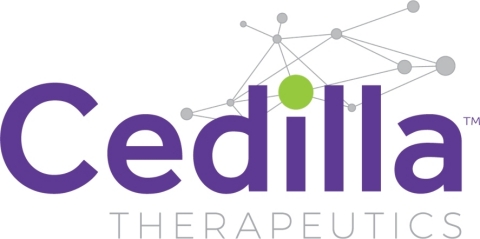Cedilla Therapeutics Unveils Lead Programs for the Conditional Inhibition of TEAD and CDK2, Two High Value and Historically Undruggable Cancer Drivers
Cedilla Therapeutics Unveils Lead Programs for the Conditional Inhibition of TEAD and CDK2, Two High Value and Historically Undruggable Cancer Drivers
--Conditional modulation of proteins in their functional state opens a new dimension in precision oncology--
--IND-enabling studies expected to initiate in 1H 2022 for TEAD program and in 2H 2022 for CDK2 program--
CAMBRIDGE, Mass.--(BUSINESS WIRE)--Cedilla Therapeutics, a biotechnology company bringing a new dimension to precision oncology, today revealed its two lead conditional inhibitor programs: an inhibitor of TEAD for the treatment of solid tumors, such as mesothelioma and certain squamous cell carcinomas; and a highly selective inhibitor of CDK2 for the treatment of multiple tumor types, including CDK4/6-resistant breast cancer, ovarian, uterine, stomach, and esophageal cancers. Both programs are wholly owned by Cedilla. In addition, Cedilla is pursuing discovery research efforts against a portfolio of high value cancer targets.
“Over the past three years, we have built an integrated suite of capabilities that enable us to understand the relevant functional states of important yet elusive cancer targets, and identify previously unrecognized small molecule binding sites,” said Alexandra Glucksmann, Ph.D., President and Chief Executive Officer of Cedilla Therapeutics. “Today, we are excited to announce our two lead programs from our internal efforts to discover conditional inhibitors: an inhibitor of TEAD and a highly selective inhibitor of CDK2. We look forward to advancing these programs closer to the clinic and creating novel medicines with the potential to deliver profound benefit to patients.”
The discovery of both programs was enabled by Cedilla’s novel approach to developing small molecule conditional inhibitors. Cedilla recognizes proteins as dynamic entities, whose function is orchestrated by inter-molecular associations and post-translational tailoring. By accounting for the native full-length protein with relevant post-translational modifications, protein-protein interactions and sub-cellular localization, Cedilla is able to understand proteins in their functional state to discover new ways to access key cancer drivers that have been considered undruggable.
“Since our founding, we have worked to develop a deep understanding of high-value, historically inaccessible targets, and to identify new vulnerabilities that may enable us to drug them more effectively, delivering superior clinical benefit,” said Brian Jones, Ph.D., Chief Scientific Officer. “Based on preclinical data, I believe our TEAD and CDK2 programs have clear advantages relative to historical approaches, offering the opportunity for preferential clinical utility, in terms of targeted efficacy or combinability with other therapeutic mechanisms. We look forward to advancing both programs into IND-enabling studies next year.”
About Cedilla’s TEAD Program
TEAD (transcriptional enhanced associate domain) is a key component of the Hippo signaling pathway that is aberrantly regulated in solid tumors such as mesothelioma and certain squamous cell carcinomas. TEAD is also increasingly implicated in resistance to targeted therapies, including those for the treatment of EGFR-mutated and KRAS-mutated lung cancer.
Cedilla’s program is designed to inhibit the function of TEAD by preventing a post-translational modification required for full function. The company’s portfolio of TEAD inhibitors encompasses multiple chemotypes with different effects on TEAD isoforms and cofactors, providing Cedilla a range of starting points for selecting a candidate with an optimal profile for effective and combinable TEAD inhibition. Cedilla plans to be conducting investigational new drug (IND) application-enabling studies in the first half of 2022.
About Cedilla’s CDK2 Program
CDK2 (cyclin dependent kinase 2) has been a major target of interest for cancer indications driven by amplification or high levels of Cyclin E, including in roughly half of patients with CDK4/6-resistant breast cancer. In addition, Cyclin E amplification drives genetically defined subsets of ovarian, uterine, stomach and esophageal cancers. The CDK2-Cyclin E cancer node has remained inaccessible due to challenges achieving selectivity over other CDKs (cyclin dependent kinases), particularly CDK1, and Cyclin E isoforms.
Cedilla has developed a unique series of inhibitors that bind to a previously unreported site on the CDK2-Cyclin E complex with unprecedented selectivity, potentially offering a substantial advance over two decades of industry efforts. Preclinical characterization suggests that the exquisite selectivity of Cedilla’s inhibitor could result in a better safety profile compared to traditional kinase inhibitors, particularly with respect to dose-limiting hematological toxicities. Cedilla plans to be conducting IND application-enabling studies in the second half of 2022. In addition, based on its unique insights into Cyclin biology, Cedilla has the potential to pursue additional drug discovery programs against related targets.
About Cedilla Therapeutics
Cedilla Therapeutics is bringing a new dimension to precision oncology. We have discovered new ways to selectively inhibit oncogenic drivers with small molecules that conditionally modulate proteins in their functional state. Our conditional inhibitors are unlocking critical and elusive cancer targets including TEAD and CDK2. We are a driven and patient-focused team. Follow our journey at www.cedillatx.com and LinkedIn.
Contacts
Investor:
Hannah Deresiewicz
Stern Investor Relations, Inc.
hannah.deresiewicz@sternir.com
Media:
Amanda Houlihan
MacDougall
cedillatx@macbiocom.com
